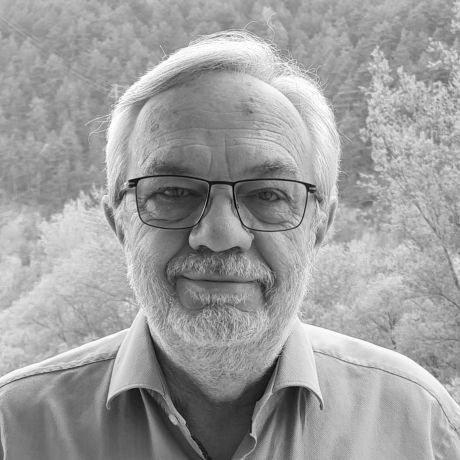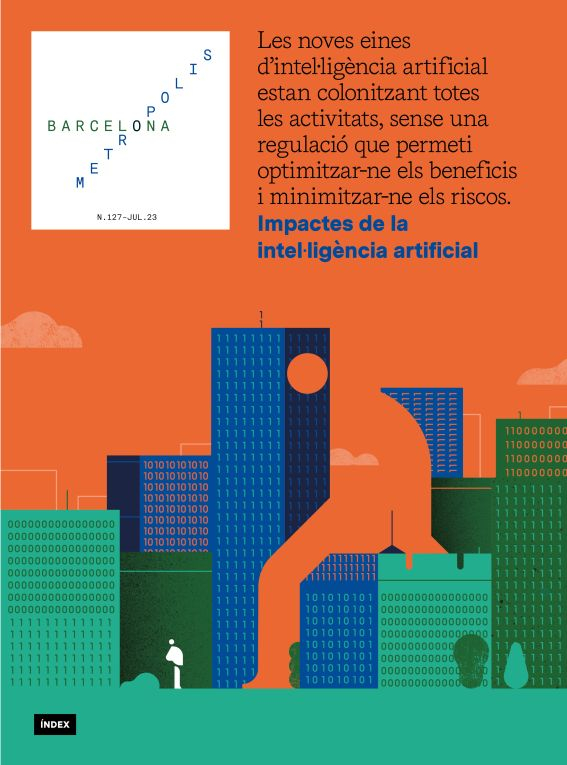Technology and humanities: A necessary dialogue
The impacts of artificial intelligence
- Dossier
- Jul 23
- 13 mins

The impact of artificial intelligence is coupled with a growing concern over the ethical, social and democratic risks posed by its uncontrolled deployment. In this scenario, the humanities, with its critical thinking and spirit of freedom, should be its foundation, to ensure the most fundamental ethical principles are respected. It would be unthinkable for AI to turn its back on this aspiration pursued by the natural intelligence that invented it.
Artificial intelligence (AI) has a strong and growing social presence, whereas the social presence of the humanities is weak and dwindling. However, the two realities are not directly comparable: AI is a computer technology and the humanities are a centuries-old cultural current. Yet this, which puts the impact of the comparison into perspective, gives food for thought in one respect: if this cultural current, as is the case, has historically been one of the mainstays behind the education of our natural intelligence (NI), we can legitimately raise two questions: can and should this technology that has been labelled intelligence – perhaps abusively so –, so often pitted against human NI to determine which will “ prevail “ in power, speed and, ultimately, mastery, do without this formative mainstay of our NI?
Do the humanities, which have formatted – to use this IT-imported term – the NI for centuries, stand in the way of AI’s deployment? Or, on the contrary, could AI benefit from a humanistic influence, the humanities understood as the educational side of humanism? Or are these questions trivial and should AI just go its own way without regard for anything else? This may be the “default”, automatic or knee-jerk response of unthinking people, but a minimum of educational, civic, social and ethical awareness – all of which are, after all, bound together by the humanistic tradition – invites us to reflect on the matter.
There are many voices, including those of AI “manufacturers” themselves, calling for a hiatus, and for reflection and the regularisation.
The growing impact of artificial intelligence is coupled with a growing concern over the ethical, social and democratic risks of its uncontrolled deployment. One such example is the “Open Letter”, in which a thousand scientists requested a six-month break in AI development, as a result of the massive spread of ChatGPT. Nevertheless, there are many voices, including those of AI “manufacturers” themselves, calling for a hiatus, and for reflection and the regularisation of invasive procedures in all realms of life. Under these circumstances, however, the failure to tap into the cultural wealth of humanism, or the humanities in their educational form, would be both serious and irresponsible, given that they are to this day the repository of the best ethical, social and democratic knowledge – understood in a plural and evolved sense up to the present day and not limited to the foundations of Greco-Latin classicism – of an ethical, social and democratic nature. Disregarding it without further consideration would be a radical (anti)ethical, (anti)social and (anti)democratic choice. A commitment must be made to harnessing humanistic knowledge, to nurturing it – including with the help of AI – and to relating it to the deployment, adaptation and application of this technology.
Humanism, complex knowledge
This reflection is meant to facilitate the endeavour. However, to avoid confusion, clarification of the concept of humanism may be needed. Humanism, the cultural foundation of the humanities, is neither an ideology nor indeed a religion: it is a current of wisdom or full culture, initiated in classical Greece and Rome, revived in the Renaissance, rekindled in the Enlightenment and in permanent renewal: Edgar Morin, Martha Nussbaum, Nuccio Ordine, Joan Fuster and George Steiner, to name but a few, are very different contemporary humanists. It is a cultural nerve of our societies, which mainly consists of “faith in freedom, in intelligence, in the power of speech, in morality and in civic and social commitment”: a synthesis of an ancient philologist, ideal for understanding the value and significance of the profile of our intellectual “formatting”, and a catalyst for a free and committed dialogue with a technology that is considered to be intelligent.[1]
Humanistic knowledge resides more in the territory of symbols and values than in that of facts and applied functionalities. The Brazilian writer Mario Quintana dared to say that “facts are a secondary aspect of reality”, not because he primarily defended the unreliable “alternative facts” of these post-truth times, but because he considered understanding, interpreting, contextualising, criticising and evaluating any fact that, whether we like it or not, necessarily seeks a framework or format in which it can satisfy our need for meaning, to be a primary or fundamental aspect of human reality.
The Kantian idea that the autonomous rational being – which we claim to be – resides “in the realm of purposes” resonates in the background; and AI, as a tool, however powerful, fast and efficient it may be, resides in the realm of tools, incapable – except for falsifications – of achieving a purpose worthy of this name on its own. And it is only in relation to one freely chosen purpose or another that our everyday events can be interpreted and assessed. AI algorithms do not think, they are thought. For, as Elvira Lindo said[2], “the algorithm is the parents”: it does nothing by itself and, above all, it is not magic, there are always “fathers and mothers” behind it who prepare the “gifts” that we give it.
Natural language under threat
Two thinkers as far apart as Yuval Noah Harari[3] and Slavoj Žižek concur in their assertions – in different terms, but fundamentally they agree: the risk of the new wave of AI – chatbots like GPT – is that it will end up “hacking” humanity’s operating system, which is none other than the enigma of meaning that each natural language provides us with. An enigma composed of keys to interpretation, mental frameworks, purposes and values, in the form of epic tales, religions, myths, poetry, novels, theatricalisations, ideologies and similar concepts that provide us with various maps for life’s journey.
The nurturing and care of natural language has always been at the heart of the humanities, which are being challenged by the threat of deterioration stemming from AI.
These chatbots, as generators of language with no basis other than a powerful but cold combination of an infinite amount of unverified data, cannot guarantee the truth of their assertions and consider that their mission is not to produce true or reliable texts, but rather plausible ones: in other words, satisfying simulations for each individual correspondent who addresses them. The line between truth and falsehood is blurred, and language becomes increasingly plain, undermining and potentially forfeiting the great variety of resources of natural language. Two prime examples: the capacity for metaphor and irony. The nurturing and care of natural language has always been at the heart of the humanities, which are being challenged by the threat of deterioration stemming from AI.
A call for ethics and democracy
A positive connection between AI and the humanities must be advocated for a number of other reasons, which are outlined below. The advent of a new technology ushers in new power, which is often in the hands of a few, even more so in the case of AI and the few big tech companies. AI manufacturers should learn the risk of hubris from the humanities, which can lead the most ironclad powers to self-destruction, like in Greek tragedies. Without so much drama, AI needs the humanities as a point of reference and a great repository of figures, myths and stories of the utmost human interest. On the other hand, AI users need the humanities for a reason as essential as the aforementioned natural language: the defence of freedom, which is inherent to the entire humanistic tradition, given the risk of AI’s attack via the invasion of privacy, manipulation based on the accumulation of data, and democratic destabilisation.
The humanities, with their promotion of critical thinking and the spirit of freedom, are the foundation required to meet the widespread and growing demand for an AI that respects the most fundamental ethical principles; ethics, as a practical philosophy or “knowledge of life” since Greek classicism, is neither a fashion nor an imposition of any authority, it is the attempt to meet the human need to learn to live a life in freedom, a good and happy life.
It would be unthinkable for AI – our new “intelligent”, albeit artificial, tool – to turn its back on this aspiration pursued by the natural intelligence that invented it. Even more so if, as we know, ethics is a necessary condition not only for personal life, but also for collective life; contrary to what some people think, the social and political commitment of humanism cannot be waived. And today, the threat to democracy – coexistence in freedom – posed by AI is more than a nightmare: we are already aware of serious disruptions in democratic processes resulting from AI-based manipulations, such as the electoral process that made Donald Trump president or the result of the Brexit referendum.
A highly respected AI technologist, Helga Nowotny[4], advocates for nothing other than the cultivation of wisdom – a concept with a strong humanistic resonance – with these words: “Algorithms can help us with many of the challenges we are up against. But if we want to preserve the human condition with all that it implies, we must learn to use them wisely and to cultivate the kind of wisdom that the future needs.”
Another leading technologist, Max Tegmark[5], says: “If we look far into the future, to the challenges associated with general superhuman AI, it is in our interest to adopt at least some basic ethical standards before we start instilling these standards in powerful machines. [...] It is in our interest to educate our young people to make technology robust and beneficial before we give it too much power.”
Can we call the so-called “new technological humanism” “invitations”? Or simply humanism? Or the cultivation of the humanities? The necessary dialogue between the skills of the new AI technology and the human know-how of NI fits any of these or similar labels. We should not fret about it, but rather work on it seriously. It is neither a technological challenge nor a humanistic challenge. It is a fundamental and future challenge that calls for all forms of intelligence.
[1] Bellardi, G. Introduzione a Cicerone. Le Orazioni III. Unione Tipografico-Editrice, Torí, p. 35. 1975.
[2] Lindo, E. "El algoritmo son los padres". El País. 2023. http://ow.ly/noCh50OrIQO
[3] Harari, Y. N. 21 lliçons per al segle xxi. Penguin Random House, Barcelona, 2018.
[4] Nowotny, H. La fe en la inteligencia artificial. Los algoritmos predictivos y el futuro de la humanidad. Galaxia Gutenberg, Barcelona, 2022.
[5] Tegmark, M. Vida 3.0. Ser humano en la era de la inteligencia artificial. Penguin Random House, Barcelona, 2018.
Books
 La intel·ligència (artificial), a la butacaUlises Cortés and Joan Manuel del Pozo. Universitat de Girona, 2021
La intel·ligència (artificial), a la butacaUlises Cortés and Joan Manuel del Pozo. Universitat de Girona, 2021
The newsletter
Subscribe to our newsletter to keep up to date with Barcelona Metròpolis' new developments




